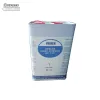Is liquid adhesive strong?
In the realm of adhesives, the debate surrounding the strength of liquid adhesive has been a topic of considerable discussion. As a versatile and widely used bonding agent, liquid adhesive has proven its effectiveness in various applications. This article aims to explore the factors that contribute to the strength of liquid adhesive and dispel common misconceptions surrounding its capabilities.
Composition and Formulation
Liquid adhesives are formulated using a diverse range of chemical compositions, each tailored to meet specific bonding requirements. Common ingredients include polymers, solvents, and additives, with variations in ratios and types determining the adhesive's properties. The flexibility of liquid adhesive formulations allows for customization, ensuring compatibility with different materials and surfaces.
Adhesive Strength: A Multifaceted Attribute
The strength of a liquid adhesive is not a one-size-fits-all characteristic. It encompasses a spectrum of properties such as tensile strength, shear strength, and peel strength. Tensile strength refers to the adhesive's ability to withstand pulling forces, shear strength pertains to its resistance against sliding forces, and peel strength measures the force required to separate bonded materials. The overall strength of a liquid adhesive depends on the specific demands of the intended application.
Substrate Compatibility
The effectiveness of liquid adhesive is significantly influenced by the compatibility between the adhesive and the materials being bonded. Certain adhesives are specially formulated for specific substrates, such as metals, plastics, wood, or ceramics. The surface energy and chemical composition of the materials play a pivotal role in determining the strength of the bond. Adhesive manufacturers often provide guidelines on substrate compatibility to ensure optimal performance.

Application Techniques
The strength of a liquid adhesive is also contingent on the application technique employed. Proper surface preparation, adhesive application, and curing conditions contribute to the overall bond strength. Adhering to recommended application methods and curing times is crucial for achieving the desired results. Rushed or improper application may compromise the adhesive's ability to form a robust bond.
Environmental Factors
Environmental conditions can impact the strength of liquid adhesive bonds. Factors such as temperature, humidity, and exposure to chemicals can affect the adhesive's performance. Some adhesives are designed to withstand extreme temperatures, while others may excel in humid environments. Understanding the environmental conditions of the application site is essential for selecting an adhesive with the appropriate strength characteristics.
Dispelling Misconceptions
One common misconception surrounding liquid adhesives is that they lack the strength to hold up in demanding applications. In reality, advancements in adhesive technology have led to the development of high-performance liquid adhesives capable of withstanding considerable stress and strain. Engineers and manufacturers routinely utilize liquid adhesives in critical applications, including aerospace, automotive, and construction, attesting to their strength and reliability.
Conclusion
In conclusion, the strength of liquid Primer is a multifaceted attribute influenced by composition, substrate compatibility, application techniques, and environmental factors. Liquid adhesives, when chosen and applied correctly, exhibit remarkable strength and versatility. Dispelling misconceptions about their capabilities is crucial in recognizing the significant role these adhesives play in modern manufacturing and construction processes. As technology continues to evolve, liquid adhesives are likely to remain a steadfast and powerful solution for a wide range of bonding needs.

